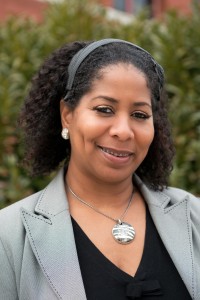
Jeff Leips
Associate Professor, Biological Sciences
2014 University System of Maryland Board of Regents’ Award for Excellence in Teaching
Jeff Leips, who joined the faculty in 2001, is making groundbreaking contributions to interdisciplinary undergraduate education in the life sciences. He was recognized for this effort with a National Academies Education Fellow award in 2004 and UMBC’s Carl Weber Award for Excellence in Science and Mathematics Teaching in 2010.
Leips implemented major changes in undergraduate biological sciences education at UMBC, focused on improving students’ quantitative reasoning skills, especially applied to biological problems. With funding from the NIH and the Howard Hughes Medical Institute, Leips worked with faculty and students to develop over 20 active learning modules and assessment tools for introductory biological sciences courses. In each module, students work in groups to solve significant biological problems requiring quantitative approaches. Assessment of these modules by an outside firm indicates that undergraduates taking these courses exhibit a significant improvement in their quantitative skills in biological contexts.
He is co-director of an NSF-funded project to establish Interdisciplinary Training for Undergraduates in Biological and Mathematical Sciences at UMBC (UBM@UMBC). This program provides a two-year research experience for pairs of students (from mathematics/statistics and biological sciences) working with a pair of faculty (one each from mathematics/statistics and biological sciences).
Leips also worked with faculty in the Department of Mathematics and Statistics to incorporate more biological applications into existing mathematics courses, and establish two new minors, one in Biomathematics (overseen by the Department of Mathematics and Statistics) and one in Quantitative Biology (overseen by the Department of Biological Sciences). This major overhaul to improve students’ quantitative skills through changes in the classroom, new research opportunities, new courses, and new minors should all have a significant and far reaching positive influence not only on UMBC’s students, but on the faculty and institution itself.
Leips received his Ph.D. in Biological Sciences from Florida State University.

Justine Marie Johnson
Associate Director, Meyerhoff Graduate Fellows Program
2013–2014 Jakubik Family Endowment Staff Award
Justine Marie Johnson began her UMBC career in 1999 in the undergraduate Meyerhoff Scholars Program. For the past 10 years, Johnson has worked with the Meyerhoff Graduate Fellows Program, and her efforts have helped establish UMBC as a national model for doctoral STEM diversity. Under Johnson’s leadership and mentoring, the Meyerhoff Graduate Fellows Program has undergone tremendous growth and expansion. In 2004, the program supported a total of 31 Ph.D. students and the retention rate was 74%. It now includes 77 participants, with a retention rate of 92% over the past five years and 80% overall, far exceeding the national rate of 40%.
Johnson devised and manages the summer bridge program for incoming Graduate Fellows, and also directs the Summer Biomedical Training Program, which supports research experiences for undergraduates who are interested in pursuing doctoral degrees in the biomedical and behavioral sciences. When funding for outreach efforts was cut, Johnson was instrumental in raising extramural funding to continue the program.
As an administrator of the Meyerhoff Graduate Fellows Program, Johnson took the lead on writing the last two successfully funded competitive renewals, with the most recent submission receiving a priority score of 13 (a score of 10 is considered perfect) and receiving $3.3 million in January 2013.
In addition to being highly regarded by her peers and the faculty at UMBC, Johnson gained a national reputation for her leadership skills and activities. She now serves as a regular member of the National Institutes of Health (NIH) Study Section that evaluates proposed diversity activities in National Human Genetics Research Institute centers, and she serves on the diversity advisory boards of several academic institutions.





